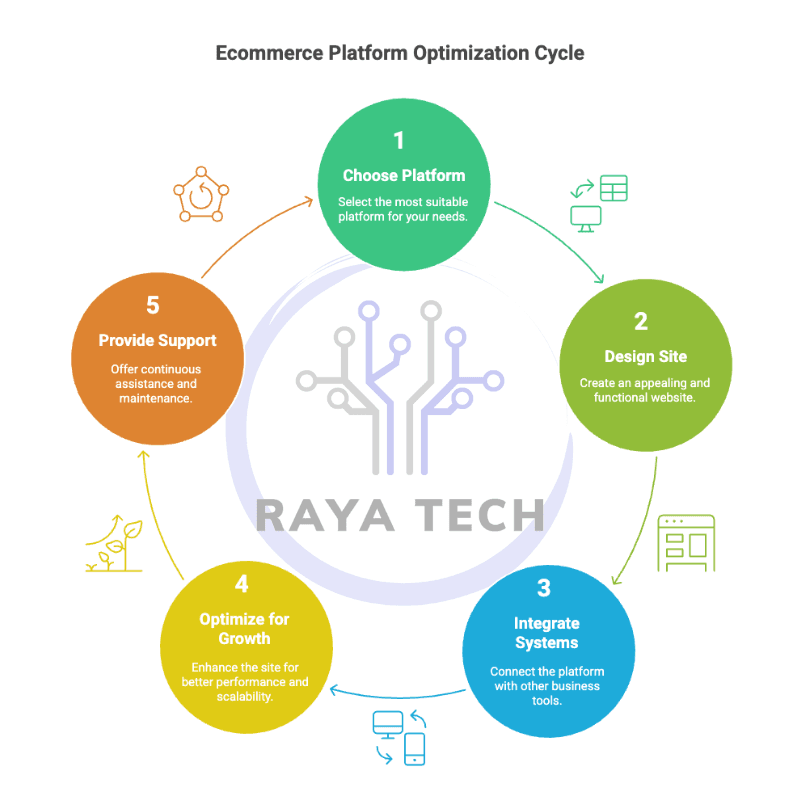Table of Contents
Ecommerce isn’t the wave of the future; it’s the reality right now. Online shopping has exploded – and it’s not slowing down. People love the convenience, the variety, and often, the better prices. For businesses, this means a huge opportunity to reach more customers. But here’s the kicker: finding the best e commerce website maker is crucial. It’s the foundation of everything. Pick the wrong one, and you could be looking at lost sales, unhappy customers, and a serious drag on your business. A tiny startup selling handmade jewelry has completely different needs than a big company with a million products. Ignoring those differences? That’s a recipe for frustration, wasted money, and a website that… well, just doesn’t work.
Wondering what is the best ecommerce website for your business? We break it down for you.
💡 New to ecommerce? Start with our complete guide on How to Create an Ecommerce Website That Sells!
What Is an Ecommerce Website Builder?
Think of an ecommerce website builder as your complete, ready-to-go digital storefront. It’s packed with all the tools you need to create, manage, and grow your online store. Everything from showcasing your products to processing payments and shipping orders is handled. It’s the simple alternative to building a store from scratch, which would require serious coding skills and a dedicated team. Most builders feature easy drag-and-drop interfaces, pre-made templates for different industries, and built-in features like inventory management, shipping integrations, and marketing tools. If designing a new house is easier than renovating an old one, well…website builders are the same.
💡 Looking for a simpler setup without any coding? Check out our complete guide on how to make a no code online shop using beginner-friendly tools and platforms.
Now, here’s where it gets interesting: there’s a big difference between general website builders and a website builder with e commerce capabilities. A general builder lets you create all kinds of sites – blogs, portfolios, landing pages. But it’s not specifically geared toward selling stuff online. A website builder with ecommerce, on the other hand, is designed for online transactions. Think product catalogs, secure shopping carts, encrypted payment gateways, and centralized order management.
The best website builder for ecommerce nails that sweet spot between being super user-friendly and offering all the features you need. It lets you run your store smoothly, without needing a degree in computer science, all while keeping your customers happy. Think of it like a generic hardware store versus a specialty tool shop, one size fits all vs quality with something for every job.
What to Look for in the Best Ecommerce Website Maker

Finding the right best e commerce website maker is all about knowing your business inside and out. What works wonders for one company could be a disaster for another. So, what should you be looking for?
- Ease of Use: Let’s face it: nobody wants to spend hours wrestling with complicated software. The ideal platform should be intuitive, even if you’re not a tech whiz. Look for that drag-and-drop interface that lets you design your site without coding. How easy is it to upload products, track inventory, generate sales reports, and fulfill orders? A simple backend saves you time and headaches, letting you focus on, you know, running your business. Less time struggling means more time succeeding!
- Design Flexibility: Your website isn’t just a store; it’s your brand’s face to the world. It needs to reflect who you are. At the very least, you’ll want a platform with plenty of customizable templates that match your brand’s vibe. Can you easily change colors, fonts, layouts, and images? You want a website that not only grabs attention but also leaves a great impression. While templates are a solid foundation, you should be able to create from a blank canvas.
- Payment Options: The more ways people can pay, the more sales you’ll make. Your platform should support a wide range of payment gateways – Stripe, PayPal, credit cards, you name it. More options mean fewer abandoned carts. Check if there are any transaction fees or PCI compliance issues. Security and customer payments should always be important.
- Scalability: You need a platform that can grow with you. Can it handle more traffic, more orders, more products? Make sure the architecture can handle future growth without needing a complete overhaul. Bonus points for easy integration with other business systems like CRM, accounting, and fulfillment. Handle high volume for now and the future!
- SEO Tools: Getting found on Google is huge. Your platform better have good SEO tools to optimize your site for search engines. Can you customize meta descriptions, image alt tags, and product descriptions? Can you generate sitemaps and manage URLs? Even better if it offers in-depth analytics to track your SEO performance. Don’t forget the blog post feature. SEO helps you grow.
- Mobile Responsiveness: Most people browse the web on their phones these days. Your site must look and work great on any device. Make sure the platform automatically adjusts to different screen sizes. Does it offer a mobile app for managing your store on the go? The website should be adaptable to all screen types!
- Customer Support: Even the best of us need help sometimes. Reliable customer support is essential for fixing problems, answering questions, and offering guidance. Does the platform offer 24/7 support via phone, email, or live chat? What’s their response time like? Do they have a knowledge base, FAQs, or community forums. Great support is what great businesses thrive on.
Best e Commerce Website Makers Compared
Alright, let’s dive into some of the top e commerce website builders of 2025. We’ll break down what they’re good at, where they fall short, and who they’re best for.
- Shopify:
- Pros: Shopify is built for ecommerce. It offers an incredibly smooth experience for setting up and running an online store. It’s easy to create product listings, manage inventory, process orders, and track shipments. Plus, the Shopify app store is packed with apps and integrations to customize your store. It’s scalable and has excellent customer support. Perfect for simplifying anything ecommerce!
- Ideal for: Businesses that are 100% focused on online sales. Startups launching their first online store and established brands expanding their reach will both find this a user-friendly option.
- WordPress + WooCommerce:
- Pros: WooCommerce is a highly flexible ecommerce plugin that works seamlessly with WordPress, the world’s most popular CMS. You get incredible control over your store’s design and functionality. It’s open-source, so you can tweak the code to your heart’s content. And WordPress is super SEO-friendly. The website builder with ecommerce is one seamless creation!
- Ideal for: Businesses that need complete control over their website and store and are willing to invest the time (or hire someone) to manage and customize everything. It’s perfect when you need advanced customization, complex integrations, or sophisticated content marketing.
- Wix: Easy drag-and-drop solutions are awesome for beginners, but Wix’s Ecommerce falls short of Shopify and WooCommerce. It might not be the best choice when scaling to a larger business.
- Squarespace: Beautiful templates and clean designs are perfect for visually focused businesses. Compared to other platforms, Squarespace isn’t as robust for large product inventories or complex shipping.
- BigCommerce: Strong ecommerce features make this platform appealing to larger businesses. Be warned – it comes with a higher cost and a steeper learning curve than Shopify.
Shopify vs WooCommerce – Which Is Best for You?
Shopify vs. WooCommerce: every new online business owner has this debate. Both are powerful, but which one fits you? Consider these factors:
- Business Goals: Are you focused solely on online sales, or do you have a broader content strategy? Do you want a site that is completely uniquely YOU, or do you want solid familiarity?
- Budget: How much can you spend on the platform, hosting, and plugins?
- Control: How much control do you want over the code and functionality? More control means more tech skills.
- Customization: Do you need extreme customization, or are you happy with pre-built options?
Here’s a quick look:
- Startup with a Tiny Budget: Shopify might be the best bet. The app store has affordable solutions for almost anything you need.
- Established Business with Complex Needs: WooCommerce’s flexibility is a huge plus. You’ll probably need to hire a developer, though.
So, which platform is best for ecommerce? It really depends on your priorities. Ideally, what is the best ecommerce website for your business fits seamlessly into your operations.
How we can help to select the best ecommerce platform

Here at Raya Tech, those are our go-to recommendations because they offer great flexibility and power. We know these platforms inside and out, the strengths, the weaknesses, everything.
We can help you:
- Choose the right platform.
- Design and build your dream ecommerce site.
- Integrate it with all your other business systems.
- Optimize your site for growth.
- Provide ongoing support.
Contact us today for a free consultation!
FAQs About Ecommerce Website Builders
Answering what is on everyone’s mind:
What is the best ecommerce website maker for beginners?
Shopify often wins because it’s so easy to use.
Which website builder with ecommerce is most scalable?
Both WooCommerce and Shopify are scalable, but WooCommerce’s open-source nature gives it the edge in flexibility.
What is the best ecommerce website for SEO?
WordPress and WooCommerce, hands down. WordPress rules content management.
Is WordPress good for ecommerce?
WooCommerce + WordPress is a killer combo.
How much does an ecommerce website cost to build?
It depends on the features, the platform, and the level of customization. Expect to pay anywhere from $500-$2,000 for a basic Shopify store, and $2,000-$10,000+ for something more custom.
Conclusion
Picking the right ecommerce website builder is a big step. It’s not just about features. It’s about what fits your business best. What works for one store might not work for another.
If you want something quick and easy to launch, Shopify is a great choice. If you’re looking for more control and room to grow, WordPress with WooCommerce is hard to beat. Both platforms are solid. The key is figuring out which one matches your goals.
At Raya Tech, we help you make that decision. We build websites that are easy to manage, look great, and help you grow. Whether you’re starting small or already scaling up, we’re here to support you at every stage.
Not sure where to start? Let’s talk. We’ll help you choose the right path and build an ecommerce site that actually works for your business.
Get in touch for a free consultation. We’re ready when you are.





